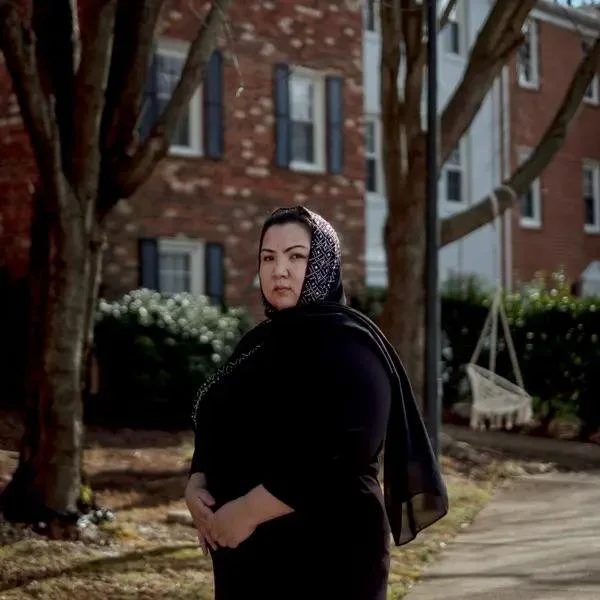Zumrat Dawut
Zumrat is a survivor of the Chinese concentration camps.
Born in Urumqi, Zumrat married a Pakistani man and they had three children. She and her husband ran an import/export business, which gave them good income and comfortable lives. They lived on the outskirts of the city in a predominantly Uyghur neighborhood, so they could have a backyard and be surrounded by family. From time to time, they heard about Uyghur people being arrested, often for political reasons, but Zumrat and her family led a quiet, normal life.
In March 2016, conditions began to worsen for Uyghur people. Uyghur schools were shut down, and Uyghur teachers lost their jobs. All Uyghur children had to attend Chinese-speaking schools, where they were forced to learn Chinese and assimilate into Chinese culture. They were kept at school late into the night, seven days a week, to accelerate their acculturation.
Zumrat started to see guards and watchtowers spring up around her. Officials recorded Zumrat’s fingerprints and voice. Surveillance cameras monitored her on the streets. Any time Zumrat would travel even short distances, she encountered police checkpoints, where Chinese officials examined Uyghur people’s phones.
Police began detaining Uyghur people for having Facebook or Whatsapp on their phones, although they weren’t told these apps were illegal. Even people who received phones secondhand were arrested for content that the prior owner had downloaded. Zumrat heard rumors that Uyghurs were being arrested for owning a Quran or a Turkish flag, or on no charges at all.
In July 2016, Zumrat was required to attend a daily flag-raising ceremony, where the Chinese flag was raised to the music of the Chinese anthem. All Uyghurs were forced to attend, young and old, through winter and summer. If their attendance dropped, they would be taken to detainment camps.
After one flag raising ceremony, Chinese officials announced that all Uyghurs with more than two children would be fined, with fines going up to $100,000. Whoever could not pay would be sent to the camps. Zumrat remembers people selling their houses, livestock, and whatever they owned. Zumrat was fined 18400 RMB (around $2675) for her third child.
Zumrat could not even retreat to the privacy of her own home. The Chinese government instituted a “Pair Up and Become Family” policy, forcing Uyghur families to host Han Chinese officials for two weeks each month. Zumrat’s family was assigned four officials. The officials recorded their conversations, and questioned Zumrat’s children about their family. Her family was not allowed to ask their “new family” anything.
Even as Uyghurs were sent to concentration camps, Zumrat’s Han Chinese neighbors were silent. Zumrat initially thought they were afraid to protest. However, Zumrat later witnessed her Han Chinese neighbors successfully protest for their exclusion from government mandated x-ray screenings, which initially applied to both Uyghurs and Han Chinese. Zumrat realized that her Han neighbors could speak out, but simply did not. She suspects they enjoyed claiming the local property of detained Uyghurs.
In March 2018, while Zumrat was preparing lunch for her children, the police called and summoned her to the police office. She rushed out of the house still in her slippers, anxious and afraid. Police brought Zumrat to the basement, where piles of religious and Uyghur books were strewn over the floor. She was taken into the questioning room and strapped to a tiger chair.
The police interrogated her all night, about her husband’s Islamic observance, her foreign travels, and her children. She was not permitted to sleep. Her feet and wrists became swollen from the tightness of the tiger chair. There was not even a private bathroom, only an open toilet off to the side. At the end of the interview, Zumrat expected to be released, since she answered honestly and did not break the law. Instead, she was sent to a camp. During her internment, she was forcibly sterilized.
Zumrat’s husband was not told where Zumrat was being held. He went from one police station to another, demanding to know what happened. He visited the Pakistani consulate in Beijing twice. After 62 days in the camps, Zumrat was released.
After her release, Zumrat heard of Mihrigul Tursun, who survived the camps, traveled to America, and publicized the camp’s horrors. Inspired, Zumrat and her family traveled to America as well. Zumrat still feared speaking out, worried that China would punish her family in China. But news reports stating “one million Uyghurs imprisoned” angered Zumrat. She remembered how every family lost someone to the camps and knew that there must be more than one million Uyghurs imprisoned. She feared that the Uyghur people were facing extinction, and decided to speak out.
Zumrat testified at the United Nations on September 27, 2019. As Zumrat feared, the Chinese government imprisoned her family. In December, she learned that her father had died, a death she attributes to the Chinese government. But Zumrat says her father is part of the Uyghurs, and all the Uyghurs are dying. This cause is larger than her family alone, and encompasses the entire Uyghur people. Zumrat knows that her people are suffering and dying, and she needs to share her story for them.

